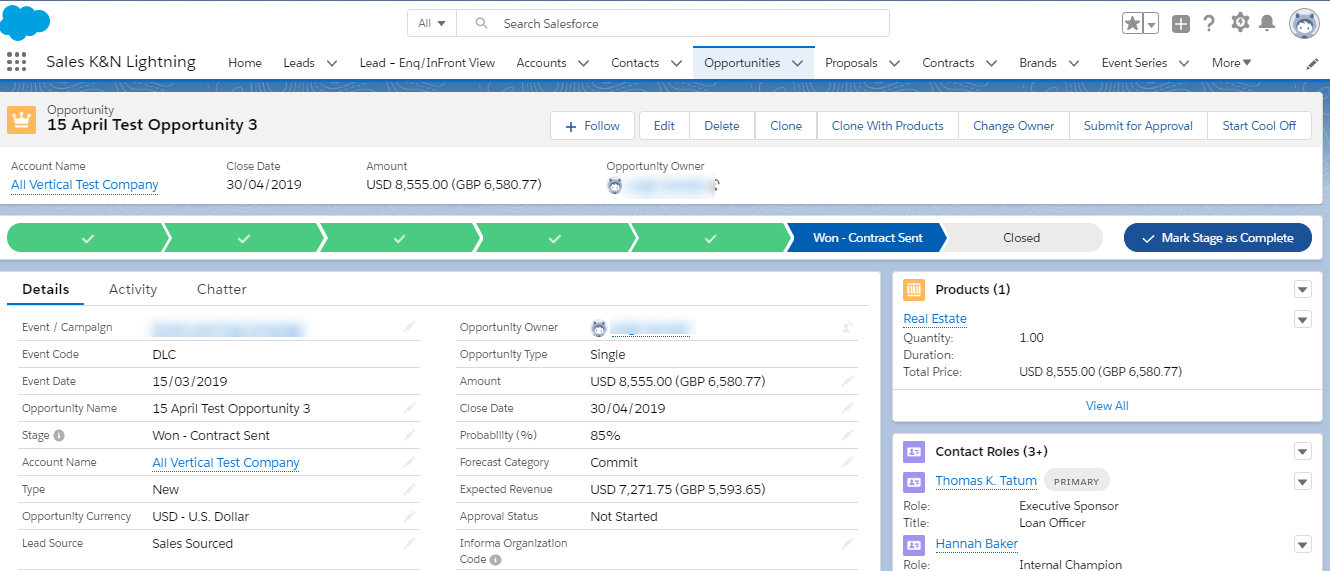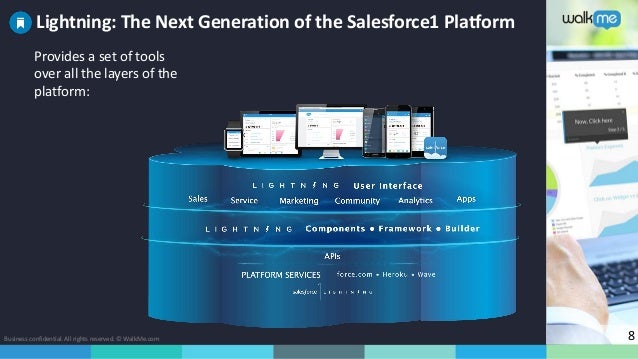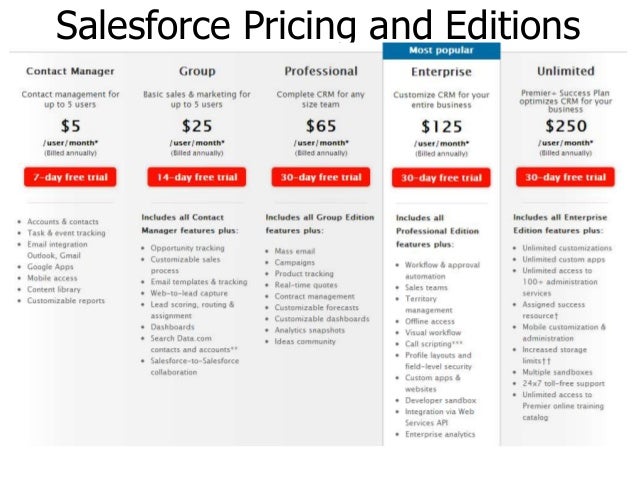
Salesforce is cloud-based software mainly used for marketing and customer relationship management. In contrast, SAP CRM is one of the most widely-used enterprise resource planning software that handles all aspects of a company, from finance to human resources. Let us take a look at differences in each aspect. Sales
Table of Contents
What is the difference between CRM and Salesforce?
Salesforce CRM automates many tedious tasks and decision-making processes out of the workday. The platform also includes a Marketing Cloud module, which helps with everything from community engagement, marketing intelligence, customer sentiment, and more. HubSpot Vs Salesforce: What is the Difference?
Is Salesforce a good CRM in general?
The new Individual object in Salesforce CRM is a good start towards fulfilling the requirements of GDPR. Individual records are related tightly to any person record in Salesforce, be it a Lead, Contact, or Person Account. It is designed to hold personal data preferences and details for processing.
Which is better, Microsoft CRM or Salesforce?
- Salesforce is the most used CRM application, and no doubt about it. It had its own time. …
- Dynamics CRM is part of Dynamics 365, which is includes ERP applications as well. …
- Dynamics CRM is growing faster than before, and of course faster than Salesforce. …
- Dynamics 365 CRM is cost effective, and I have seen businesses migrating from salesforce to Dynamic
How to implement Salesforce CRM successfully?
Implementation of a new CRM system generally occurs in four steps. Salesforce recommends these steps for a successful implementation: Prepare by building a team, defining your vision, and setting goals. Set up by importing data, defining permissions, and adding customizations. Engage company-wide through training before going live.

Is CRM and Salesforce same?
Salesforce is not just a CRM. Clearly it is the undisputed leader of the pack in the world of customer relationship management software, but thinking of it as only a system for managing leads and sales pipelines is a huge mistake.
Is CRM part of Salesforce?
Salesforce Is the World’s #1 CRM Today, over 100,000 of the world’s most innovative companies—large, medium, and small—use Salesforce to close bigger deals, faster. Using Salesforce is as easy as clicking a button, which means better adoption rates, and more effective collaboration, mobilization, and revenue growth.
What type of CRM is Salesforce?
Salesforce is a cloud-based customer relationship management (CRM) software that helps businesses connect with and get more information about their customer base.
Why is CRM important Salesforce?
Data organized and presented by a CRM platform leads to a better understanding of customers. This leads to better messaging and outreach, much of which can be done with automation, which helps you offer better, more efficient customer service. Furthermore, your teams can collaborate more easily and reduce siloes.
What are the 3 types of CRM?
To start, there are three main types of CRMs: collaborative, operational, and analytical. To help you get your bearings, we’ll cover what a CRM is to begin with, how the three types of CRMs differ, and how to select the right product for your company.
What are CRM objects in Salesforce?
Standard objects are provided by Salesforce as a basic CRM structure. These include account, contact, opportunity, lead, campaign and so on. These are the tables that contain the records in any standard tabs, such as Accounts, Contacts, Opportunities, Leads, Campaigns, and so on.
Who uses Salesforce CRM?
Companies using Salesforce CRM for CRM include: Walmart Inc., a United States based Retail organisation with 2300000 employees and revenues of $572.75 billion, UnitedHealth Group Incorporated, a United States based Healthcare organisation with 350000 employees and revenues of $285.27 billion, McKesson Corporation, a …
Is Salesforce a ERP or CRM?
Salesforce is not an ERP. Salesforce offers various business solutions, which can be integrated to enhance and support your ERP but it does not provide an ERP product. At the heart of Salesforce is its CRM — Customer 360, which is the world’s #1 CRM system.
What is the main purpose of Salesforce?
Salesforce, Inc. is a famous American cloud-based software company that provides CRM services. Salesforce is a popular CRM tool for support, sales, and marketing teams worldwide. Salesforce services allow businesses to use cloud technology to better connect with partners, customers, and potential customers.
What is an example of CRM?
Example of CRM: Global Leading Companies & Customer Relationship Management. Amazon, Apple, and Coca-Cola are three great examples of companies taking advantage of CRM and making consumer’s data work for them. Amazon would probably never become a leader in e-commerce without utilizing a CRM.
What is CRM and how it works?
CRM stands for “Customer Relationship Management” and is a software system that helps business owners easily track all communications and nurture relationships with their leads and clients. A CRM replaces the multitude of spreadsheets, databases and apps that many businesses patch together to track client data.
What are the main benefits of CRM?
6 CRM benefits to make your customer relationships betterBetter knowledge of customers. … Better segmentation. … Better customer retention. … Better anticipation of needs. … Better and speedier communication. … Better protection of data privacy.
What is CRM in business?
Broadly, CRM is any practice, technology, or strategy designed to help businesses improve their customer relationships.
What does CRM stand for?
Despite never having the proper periods, CRM is actually an acronym that stands for customer relationship management. Broadly, CRM is any practice, technology, or strategy designed to help businesses improve their customer relationships. In today’s marketplace, CRM most often refers to the specific tools, usually a web application or software, …
How to integrate CRM?
CRM integration can happen in multiple ways: Companies can invest solely in products and services from one provider so all programs and tools automatically integrate and share data. Developers can write quick lines of code to force two systems to communicate.
What is CRM integration?
CRM integration is part of an overall customer data integration strategy. Both tasks can be burdensome.
What is CRM API?
For CRM integration, system APIs can be used with specific systems, including ERP, customer and billing systems, and proprietary databases, such as a third-party payment processor. Process APIs are the second tier and combine system APIs for a specific business purpose.
What is data integration insight?
Data integration empowers your employees with information.
Why do businesses use data?
When businesses use data thoughtfully to provide better customer experiences, both customers and companies benefit. However, to benefit, companies must organize and integrate data, glean insights from it, and act on those insights. Data-based decisions and actions drive a company forward. IT professionals and company decision makers face an uphill …
Why is machine learning important in CRM?
When companies integrate data into one central location, such as a CRM platform, it’s easier to analyze and process , especially using machine learning, a subset of AI. Companies can analyze data faster with machine learning and make decisions based on reality and statistical trends, not estimates.
Is CRM fragmented?
This is true for 57% of businesses, whose leaders say CRM is fragmented, with some, many, or all departments having their own CRM. Marketing works separately from sales, which works separately from customer service, and so forth. In essence, the left hand doesn’t know what the right hand is doing.
What is Salesforce CRM?
Cloud-based CRM systems such as Salesforce (Learn more: What is Salesforce?) mean every user has the same information, all the time. Your sales teams out on the road can check data, update it instantly after a meeting, or work from anywhere. The same information is available to anyone who needs it, from the sales team to the customer service representatives.
What are the advantages of cloud CRM?
A cloud-based CRM platform offers you: 1 Faster deployment 2 Automatic software updates 3 Cost-effectiveness and scalability 4 The ability to work from anywhere, on any device 5 Increased collaboration
What does more administration mean in sales?
More administration means less time for everything else. An active sales team can generate a flood of data. Reps are out on the road talking to customers, meeting prospects, and finding out valuable information – but all too often this information gets stored in handwritten notes, laptops, or inside the heads of your salespeople.
Why are reports so hard to create?
Reports can be hard to create and they can waste valuable selling time. Managers can lose sight of what their teams are up to, which means that they can’t offer the right support at the right time – while a lack of oversight can also result in a lack of accountability from the team.
Is CRM easy to implement?
CRM can be quick and easy to implement. A cloud-based system doesn’t need special installation, and there’s no hardware to set up, keeping IT costs low and removing the headache of version control and update schedules.
Why do we need a CRM?
A CRM enables your faculty and staff to spend more time with their students and your engagement team to focus on creating an excellent donor experience. By investing in a CRM now, you’re setting your team and your organization up for a long-term return on your investment and sustained growth.
How does CRM work?
CRM can help you manage mission-critical functions for your school or nonprofit, such as: Managing marketing campaigns. Unifying student communications. Identifying prospective donors. Storing constituent information. A CRM system works by collecting a constituent, donor, student, or potential supporter information.
What is CRM in education?
Educational institutions — from kindergarten and elementary schools to colleges and universities — use a CRM to unify and streamline communications with current and prospective students.
What is CRM tool?
A CRM gives organizations the tools to streamline their operations, keep track of customer interactions, and unify data or team silos into a single source of truth. The best CRM tools offer one integrated platform that provides all your departments a single shared view of every customer, constituent, or student.
What is CRM software?
Given that CRM is the fastest-growing enterprise application software category , more companies are making the decision to digitize and unify their operations everyday. For growth-minded organizations, CRMs offer the digital infrastructure, the data-driven culture, and the customer support that are key to creating long-term success.
What are the benefits of cloud CRM?
Cloud-based CRMs mean that you don’t need to worry about installing software on countless computers, tablets, or mobile devices. On top of not having to worry about installing software on every device you own, there are added benefits to having everything online in a secure environment, such as: 1 More accessible database 2 Solicit the help of third party service providers 3 Lower costs 4 More environmentally-friendly option that doesn’t add unnecessary waste
Why use CRM for nonprofits?
Nonprofit organizations are using CRM technology in countless impactful ways to make meaningful change and create lasting impact — from connecting with the next generation of donors to accelerating vaccine management to reducing the education gap for girls across the world.
Why is Salesforce the #1 CRM?
Here’s why Salesforce is the #1 CRM for growing businesses. Salesforce is the #1 intelligent CRM platform for businesses of all sizes. Recognized by industry analysts and by leading user review organizations as the market leader for CRM technology, Salesforce provides out-of-the-box solutions that let growing businesses easily implement …
Why was Salesforce founded?
Salesforce was founded on a simple principle: to help our customers succeed. That principle has formed the basis of our business model, underscoring a culture of constant innovation throughout our organization.
Is Salesforce easy to add users?
Small and midsize businesses need to be sure their technology will scale with growth. With Salesforce, it’s easy to add users and functionality in just a few clicks. Wouldn’t you rather grow your business on a single, secure, and scalable platform that’s easy to customize and upgrade without anything breaking?
Where did CRM originate?
The first recorded example of trade dates back 20,000 years, during this time obsidian knives were traded in what is now Papua New Guinea, between islands that had valuable obsidian deposits and those that did not. Obsidian was prized globally in those early times for its suitability for knives and other cutting implements and was traded in early Europe and Asia as well as the Americas.
Who invented CRM?
The beginnings of CRM as we know it started in the 1980s. Robert and Kate Kestnbaum were pioneers of database marketing. Which was a form of direct marketing that analysed the customer database statistically to identify which customers would be most likely to react to a marketing campaign. The concept took off and Kestnbaum, together with Robert Shaw, brought us new concepts and methodologies, ranging from customer lifetime value to channel management. There is a lot of debate about who invented CRM, but, if you take Bob Kestnbaum’s contributions to modern marketing and strategy, he probably has earned the crown.
Is CRM in the 21st century?
CRM in the 21st Century. As of now, the market for new CRM products does not seem to have reached it’s saturation point. New companies continue to come to market with cloud products, while existing vendors have changed their licensing models to offer cloud alternatives to traditional site licenses.
1. Connect with your ideal customers
You’ve spent time and resources attracting and generating new leads, but do you know how to prioritize them?
2. Proactively manage customer relationships
Eighty-three percent of sales professionals reported the pandemic increased the importance of building trust before a sale.
3. Reduce the cost of sales
New customers are a key ingredient of continued growth, but they’re not easy to come by. The good news is you can offset new customer acquisition costs through sales to your existing customer base.
4. Increase employee productivity
Adopting the right technology frees up your teams from process-heavy tasks and gives them more time to connect with customers. Manual operations like hunting for contact information or entering data can be automated or eliminated from customer-related processes.
5. Deliver better customer service
Seventy-six percent of customers expect consistent interactions across departments. In 2020, 52% of customers expected offers to always be personalized — up from 49% in 2019.
6. Improve customer retention
Visibility across all your relationships can help your teams proactively address at-risk accounts and present satisfied customers with new opportunities at just the right moment.
How does CRM help in business?
A CRM system can help you improve business performance by: Improving sales efficiency: Prioritise leads and opportunities that are highly likely to convert and close based on customer interactions with your company . Boosting sales effectiveness: Know which customers are engaged and the right time to reach out for optimal response.
Why is relationship management important?
Here’s how relationship management technology can help you be more connected to customers, improves business performance, and grows your company bigger and faster than ever:
